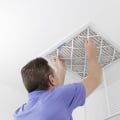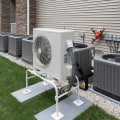Heating, ventilation, and air conditioning (HVAC) systems are designed to move air, heat or cool an interior space. An air conditioning system starts with ventilation that brings fresh air to a building. The important thing to understand is that HVAC equipment moves air. Generally, there is a system for transferring warm air to other areas, either inside or outside the house.
A home's air conditioner, heat pump, and boiler capture or create heat, and then the fan and ducts help facilitate movement.
What is HVAC?
HVAC stands for heating, ventilation and air conditioning. This system provides heating and cooling to residential and commercial buildings. You can find HVAC systems everywhere, from single-family homes to submarines, where they provide the means for environmental comfort.These systems use fresh outdoor air to provide high-quality indoor air.
What Does Ventilation Do?
Ventilation is the process of replacing or exchanging air within a space. This provides better indoor air quality and involves eliminating moisture, smoke, odors, heat, dust, airborne bacteria, carbon dioxide and other gases, as well as temperature control and oxygen replacement.The Three Main Functions of an HVAC System
The three main functions of an HVAC system are interrelated, especially when it provides acceptable indoor air quality and thermal comfort.It is designed to prevent moisture condensation in the HVAC system itself, which can damage it in the long term. Dehumidifiers and humidifiers are often forgotten, but they can be an important part of a whole-home heating, ventilation and air conditioning system. Modern construction is creating homes that are much more sealed, so ventilation is becoming an increasingly important component in home HVAC systems. While many of these components are included as part of the purchase of an HVAC system, there are times when you may need to purchase or replace just one of the many types of equipment listed below.
What Does an HVAC System Do?
An HVAC system is the equipment, technology, and processes used to heat, cool, and ventilate a commercial or residential property. Most HVAC units have a life expectancy of between 10 and 25 years, but good maintenance habits can save you money in the long run. Breaking down the components of an HVAC system can help you understand this important part of your home better. While a licensed HVAC contractor must do the work on your system, the more you know about it, the better your chance of choosing the best system, options and accessories for your home.It's important to remember that a central air conditioning system is a living system that breathes and works as a whole.
Maintenance Needs for Different Types of HVAC Systems
With so many different types of HVAC to choose from, it's not surprising that your maintenance needs vary. Regular maintenance on your HVAC system will help keep it running efficiently and extend its life span. It's important to have your system inspected at least once a year by a qualified technician who can check for any potential problems that could lead to costly repairs down the road.Having an understanding of how your HVAC system works will help you make informed decisions about its maintenance needs. Knowing what type of system you have will also help you determine what type of maintenance is necessary for optimal performance. Whether you're looking for a new system or just want to make sure your current one is running efficiently, understanding how your HVAC works will help you make sure it's running at its best.



